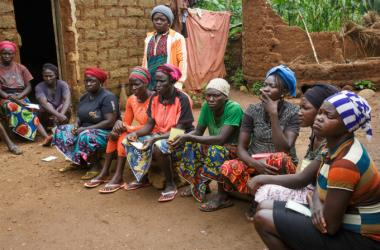On Saturday, June 23rd, at least 200 people were killed in northern Nigeria as a result of massive, ongoing violence between the Muslim Fulani herdsman and the Christian farmers in Plateau State. The attack hit particularly close to home for me, as a member of Women for Women International’s staff was injured in the attacks. Sylvester’s injuries and the tense situation in Jos, where our country office is located, forced us to temporarily suspend all programs in the region until further notice.
Sectarian violence in Nigeria is nothing new to this region. As the population in Nigeria has grown, the availability of farm and grazing land has shrunk. This has spawned violence between herders and farmers as they compete over land ownership. Religious tensions – with divides profoundly deepened due to the Boko Haram insurgency - have contributed to the conflict making it more complex.
Behind the attacks are real people whose lives have been greatly impacted. Take Lydia Pam Davou, for example. She is a 45-year old widow with eight children whose husband was brutally murdered in 2015 by herdsman who overtook his village and farmland. He and other farmers in the village stayed behind to protect the farmland, but his rotting, beaten body was discovered in a well days after he went missing.
Lydia was broken down mentally, physically and financially. She was forced to live with relatives and pull her kids out of school because she could no longer afford to pay for their education. Through our program, she was able to learn new skills, get back on her feet, and provide for her family, but of course the loss of her husband and the impact his death had on her life and the lives of her children can never be truly repaired.
Women for Women International’s mission is to help marginalized women in countries ravaged by conflict and war get back on their feet by giving them the tools and support they need to be economically self-sufficient. Through our yearlong program, women learn vocational and business skills and about their health and rights. They increase their income, build networks of support, and begin to put together their families and communities torn apart by war. We launched our work in the Plateau State in 2003 when violence between the two communities escalated, and we remain committed to our work for women and communities harmed by violent conflict in the region.
But when regions become too dangerous and when the lives of our staff are at risk, we are forced to retreat. Deciding to suspend our work is a difficult, heart-wrenching choice, as we know our lack of presence can have devastating consequences on the communities and women we serve. Matters are further complicated when the women in our program are displaced due to conflict and unable to return to their homes, as is the case in Plateau right now. It is critical that we be able to not only continue to deliver our program, but also to expand. And to do that we need the attention and support of the international community.
The ongoing conflict among Muslim Fulani herdsmen and Christian farmers is not as well-known but can be as devastating as the Boko Haram’s attacks. This repeated violence receives little to no global attention and the millions of people impacted by it remain unheard and unnamed. In conversations with editors and journalists I’ve learned that many believe U.S. audiences will not be moved by news of sectarian conflict in Africa because they don’t consider it new “news”. Deeply rooted in over-simplified stereotypes about Africa, not only the audience but perhaps even news agencies have been desensitized to negative news coming out of the vastly diverse continent.
The nearly undivided attention being paid to important issues and tragic events in the U.S. itself has also caused fewer eyes to look abroad. However, as we’ve learned in the past, it doesn’t take much for issues abroad to impact daily realities and lives in the U.S. and it is paramount to remain aware of and address human rights issues regardless of where they take place.
We are all bound by one shared humanity. There can never be true peace in our lives, nor sustainable prosperity, as long as conflict dominates the lives of others. Unchecked violence and conflict spreads, leading to displacement, destroyed lives, and unfulfilled potential that affects all of us.
Women for Women International will continue to do the work to help rebuild the lives, particularly of the women, who have been harmed by this violence. Because of our thousands of supporters, we are able to step forward to help when others step back. But we cannot do so when conflict gets so bad that we cannot even operate, or when the news does not break through or get covered. It is time for the international community to quit turning a blind eye to conflict in Nigeria, so that women like Lydia can live their full lives free from violence and fear.

